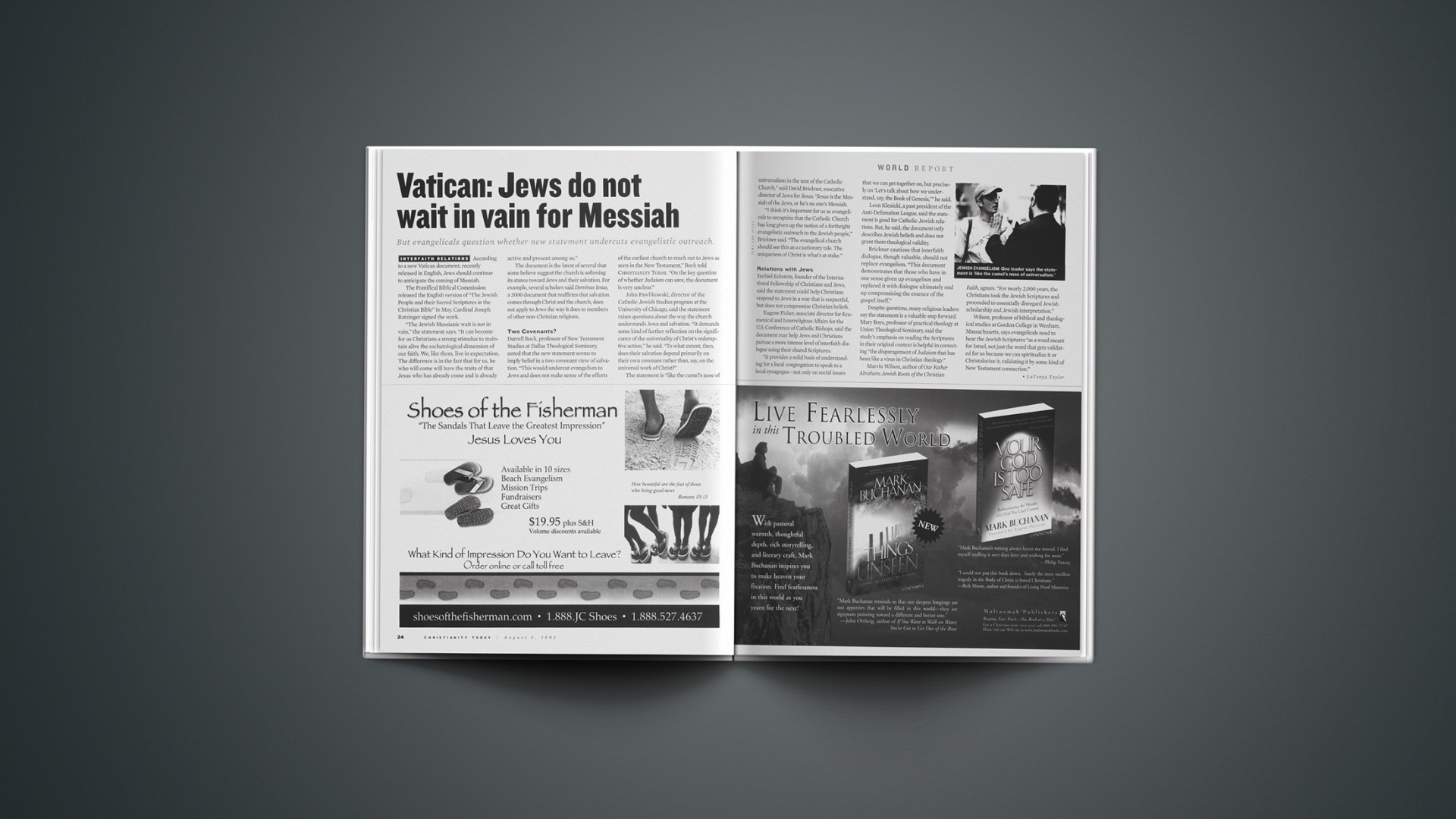According to a new Vatican document, recently released in English, Jews should continue to anticipate the coming of Messiah.
The Pontifical Biblical Commission released the English version of “The Jewish People and their Sacred Scriptures in the Christian Bible” in May. Cardinal Joseph Ratzinger signed the work.
“The Jewish Messianic wait is not in vain,” the statement says. “It can become for us Christians a strong stimulus to maintain alive the eschatological dimension of our faith. We, like them, live in expectation. The difference is in the fact that for us, he who will come will have the traits of that Jesus who has already come and is already active and present among us.”
The document is the latest of several that some believe suggest the church is softening its stance toward Jews and their salvation. For example, several scholars said Dominus Iesus, a 2000 document that reaffirms that salvation comes through Christ and the church, does not apply to Jews the way it does to members of other non-Christian religions.
Two Covenants?
Darrell Bock, professor of New Testament Studies at Dallas Theological Seminary, noted that the new statement seems to imply belief in a two-covenant view of salvation. “This would undercut evangelism to Jews and does not make sense of the efforts of the earliest church to reach out to Jews as seen in the New Testament,” Bock told Christianity Today. “On the key question of whether Judaism can save, the document is very unclear.”
John Pawlikowski, director of the Catholic-Jewish Studies program at the University of Chicago, said the statement raises questions about the way the church understands Jews and salvation. “It demands some kind of further reflection on the significance of the universality of Christ’s redemptive action,” he said. “To what extent, then, does their salvation depend primarily on their own covenant rather than, say, on the universal work of Christ?”
The statement is “like the camel’s nose of universalism in the tent of the Catholic Church,” said David Brickner, executive director of Jews for Jesus. “Jesus is the Messiah of the Jews, or he’s no one’s Messiah.
“I think it’s important for us as evangelicals to recognize that the Catholic Church has long given up the notion of a forthright evangelistic outreach to the Jewish people,” Brickner said. “The evangelical church should see this as a cautionary tale. The uniqueness of Christ is what’s at stake.”
Relations with Jews
Yechiel Eckstein, founder of the International Fellowship of Christians and Jews, said the statement could help Christians respond to Jews in a way that is respectful, but does not compromise Christian beliefs.
Eugene Fisher, associate director for Ecumenical and Interreligious Affairs for the U.S. Conference of Catholic Bishops, said the document may help Jews and Christians pursue a more intense level of interfaith dialogue using their shared Scriptures.
“It provides a solid basis of understanding for a local congregation to speak to a local synagogue—not only on social issues that we can get together on, but precisely on ‘Let’s talk about how we understand, say, the Book of Genesis,’ ” he said.
Leon Klenicki, a past president of the Anti-Defamation League, said the statement is good for Catholic-Jewish relations. But, he said, the document only describes Jewish beliefs and does not grant them theological validity.
Brickner cautions that interfaith dialogue, though valuable, should not replace evangelism. “This document demonstrates that those who have in one sense given up evangelism and replaced it with dialogue ultimately end up compromising the essence of the gospel itself.”
Despite questions, many religious leaders say the statement is a valuable step forward. Mary Boys, professor of practical theology at Union Theological Seminary, said the study’s emphasis on reading the Scriptures in their original context is helpful in correcting “the disparagement of Judaism that has been like a virus in Christian theology.”
Marvin Wilson, author of Our Father Abraham: Jewish Roots of the Christian Faith, agrees. “For nearly 2,000 years, the Christians took the Jewish Scriptures and proceeded to essentially disregard Jewish scholarship and Jewish interpretation.”
Wilson, professor of biblical and theological studies at Gordon College in Wenham, Massachusetts, says evangelicals need to hear the Jewish Scriptures “as a word meant for Israel, not just the word that gets validated for us because we can spiritualize it or Christolocize it, validating it by some kind of New Testament connection.”
Copyright © 2002 Christianity Today. Click for reprint information.
Related Elsewhere
“The Jewish People and their Sacred Scriptures in the Christian Bible” is posted online at the official Vatican website.










